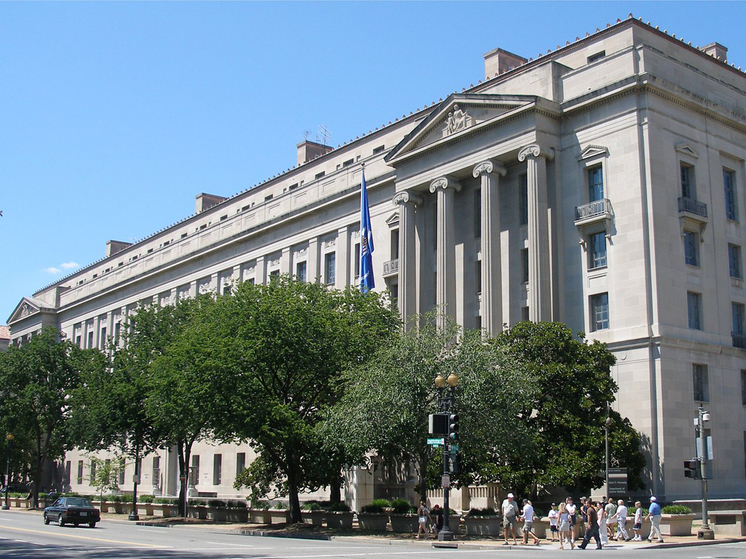This is illegal, but only fear of losing confidence can prevent Washington from doing this
The US Department of Justice is looking for ways to transfer Russian assets that have been sanctioned to Kiev. This was reported by CBS. The total amount of such assistance will exceed $1 billion. The Kremlin has repeatedly pointed out that the confiscation of Russian assets is essentially theft and contrary to international law. Can something stop the United States in their intention to give Russian money to Kyiv and whether such behavior of the Americans will become an incentive for similar actions by Europeans, experts told MK.

This is not the first time the United States has blocked the assets of sanctioned countries. So, before the start of the NWO, Iran was the leader in terms of the number of sanctions imposed against it. About $7 billion worth of Tehran's assets were also blocked by the White House as part of the restrictions imposed against the Islamic State. However, no one has negotiated to transfer Iranian assets to third countries as part of any assistance. On the contrary, these funds were the subject of bargaining in international negotiations, and in October 2022 there were reports that, with the participation of Oman, it was possible to agree on the transfer of most of the frozen funds back to Iran as part of a prisoner exchange agreement.
It is different with Russia . As soon as at the end of February 2022, the United States seized the assets of our country in the amount of more than a billion dollars, talk immediately began that they could be transferred as assistance to the Kyiv regime. At first it looked only like a populist statement. However, by the end of last year, it became clear that the US authorities could move from words to deeds.
And now the Deputy Minister of Justice — US Attorney General Lisa Monaco frankly admitted that the United States wants to get permission from Congress to use the funds received for the benefit of the people of Ukraine.
In Kiev itself, it was repeatedly proposed to send frozen Russian assets to help Ukraine . The White House initially opposed the confiscation of our country's assets, calling it legally impossible.
However, in December 2022, the US Senate approved a budget amendment allowing the transfer of confiscated assets of Russian businessmen for humanitarian and military assistance to Ukraine. And on February 4, US Attorney General Merrick Garland announced the transfer of the confiscated assets of Russian businessman Konstantin Malofeev in the amount of $5.4 million for the needs of Kyiv. Malofeev has long been under US and European sanctions. His foundation abroad is suspected of helping the militiamen of Donbass for more than a year.
Now the United States has proposed a new initiative. Analysts interviewed by MK argue that only fear of losing their reputation in the eyes of other large investors in the American economy can stop the White House, but this motive is very weak.
“The transfer of Russian assets to Ukraine is absolutely illegal, which will not prevent the United States from carrying out this operation. Washington in matters of foreign policy is not guided by international law. Rather, the United States is stopping drastic actions from the possible consequences in the form of the withdrawal of foreign investors from Treasuries (the generalized name for the debt obligations of the American government. — “MK”).
This step may well be followed by the seizure of other Russian assets, say, in Europe. Ukraine is financed by international loans, which it will not be able to repay within a reasonable time. As a result, Ukraine can expect a default on debts, and the resulting liabilities will be closed at the expense of the assets of the Russian Federation abroad.
At the same time, let me remind you that funds from foreign investors are blocked in Russia. When the United States or other countries write off the assets of the Russian Federation, Russia will write off the funds of these investors and compensate for the losses.”
“In 2023, amendments to US legislation were adopted that allow the transfer of confiscated assets of persons subject to US sanctions for the needs of the Ukrainian government. It is important to note that in order to transfer such assets, the person is required to be under sanctions; that such person's assets be seized; and that these assets go through the confiscation procedure. This procedure is regulated by US law and requires the prosecution to prove the legality of the action.
In general, this corresponds to the general logic of sanctions restrictions on individuals and does not directly violate international law. At the same time, individuals have the opportunity to apply to local courts, as well as to international arbitration (if there is an applicable investment protection agreement) to challenge the actions of the executive branch of government. Similar actions, perhaps, should be expected from other unfriendly states. However, due to the complexity of the confiscation procedure and the need to prove the ownership of an asset by a person, this process cannot be quick.
State assets, in turn, have immunity: their confiscation will require the adoption of special legislation. Unfriendly countries are not yet taking this step, as this will call into question the safety of the funds of any other states.”
“Talks about the confiscation of Russian assets regularly arise in the West, but action can come with great difficulty. It is impossible to confiscate Russia's sovereign assets, because in Western countries there is no such norm in the legislation, and few people will be ready to change laws and create a precedent for this.
In the current situation, the maximum that can be achieved in the West is confiscation assets of individual citizens and companies, and then if they can accuse them and prove that the money was acquired by criminal means or can be directed «to finance terrorism».


